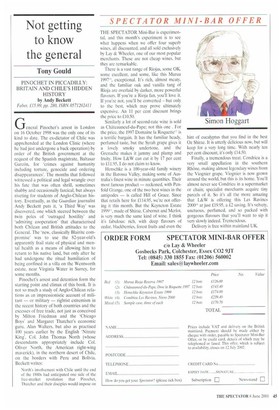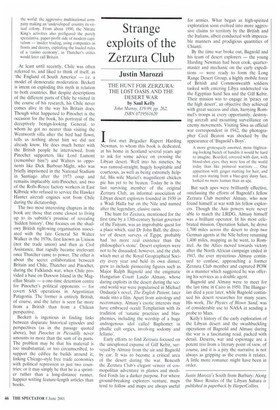Not getting to know the general
Tony Gould
PINOCHET IN PICCADILLY: BRITAIN AND CHILE'S HIDDEN HISTORY by Andy Beckett Faber. £15.99, pp. 280, ISBN 05 71202411 General Pinochet's arrest in London on 16 October 1998 was the only one of its kind to date. The ex-dictator of Chile was apprehended at the London Clinic (where he had just undergone a back operation) by order of the British government at the request of the Spanish magistrate, Baltasar Garcon, for 'crimes against humanity including torture, genocide and ordering disappearances'. The months that followed witnessed a political and legal wrangle over his fate that was often shrill, sometimes shabby and occasionally farcical, but always riveting for students of Anglo-Chilean history. Eventually, as the Guardian journalist Andy Beckett puts it, -a Third Way' was discovered, one which steered between the twin poles of 'outraged hostility' and 'admiring cooperation' that characterised both Chilean and British attitudes to the General. The 'new, classically Blairite compromise' was to use the 82-year-old's apparently frail state of physical and mental health as a means of allowing him to return to his native land, but only after he had undergone the ritual humiliation of being confined in a villa on the Wentworth estate, near Virginia Water in Surrey, for some months.
Pinochet's arrest and detention form the starting point and climax of this book. It is not so much a study of Anglo-Chilean relations as an impressionistic account of militant — or military — rightist extremism in the recent history of both countries and the excesses of free trade, not just as conceived by Milton Friedman and the 'Chicago Boys' and Margaret Thatcher's economic guru. Alan Walters, but also as practised 100 years earlier by the English 'Nitrate King', Col. John Thomas North (whose descendants appropriately include Col. Oliver North, the American right-wing maverick), in the northern desert of Chile, on the borders with Peru and Bolivia. Beckett writes:
North's involvement with Chile until the end of the 1880s had anticipated one side of the
free-market revolution that Pinochet, Thatcher and their disciples would impose on the world: the aggressive multinational company making an 'undeveloped' country its virtual colony. From about 1890, the Nitrate King's activities also prefigured the purely speculative, paper-profit side of modern capitalism — insider trading, using companies as fronts and decoys, exploiting the loaded rules of a 'casino economy', as Thatcher's critics would later call Britain.
At least until recently, Chile was often referred to, and liked to think of itself, as 'the England of South America' — i.e. a model of democratic moderation. Beckett is intent on exploding this myth in relation to both countries. But despite descriptions of the different parts of Chile he visited in the course of his research, his Chile never comes alive in the way his Britain does. Though what happened to Pinochet is the occasion for the book, his portrayal of the deceptively benign-looking General, to whom he got no nearer than visiting the Wentworth villa after the bird had flown, tells us nothing about him we did not already know. He does much better with the British people he interviewed, from Pinochet supporters like Lord Lamont (remember him?) and Walters to opponents like Dick Barbour-Might, who was briefly imprisoned in the National Stadium in Santiago after the 1973 coup and remains implacably anti-Pinochet, and two of the Rolls-Royce factory workers in East Kilbride who refused to service the Hawker Hunter aircraft engines sent from Chile during the dictatorship.
The two most interesting chapters in the book are those that come closest to living up to its subtitle's promise of revealing 'hidden history'. One focuses on the shadowy British right-wing organisation associated with the late General Sir Walter Walker in the 1970s, first known as Unison (not the trade union) and then as Civil Assistance, that rapidly became irrelevant once Thatcher came to power. The other is about the secret collaboration between Britain and Chile, Thatcher and Pinochet, during the Falklands war, when Chile provided a base on Dawson Island in the Magellan Straits — a one-time detention centre for Pinochet's political opponents — for covert SAS operations in Argentinian Patagonia. The former is entirely British, of course, and the latter is seen far more from a British than from a Chilean perspective.
Beckett is ingenious in finding links between disparate historical episodes and perspectives (as in the passage quoted above), but Pinochet in Piccadilly never amounts to more than the sum of its parts. The problem may be that his material is too insubstantial, or too circumscribed, to support the edifice he builds around it, linking Chicago-style free trade economics with political repression in just two countries; or it may simply be that he is a sprinter rather than a long-distance runner, happier writing feature-length articles than books.























































































 Previous page
Previous page